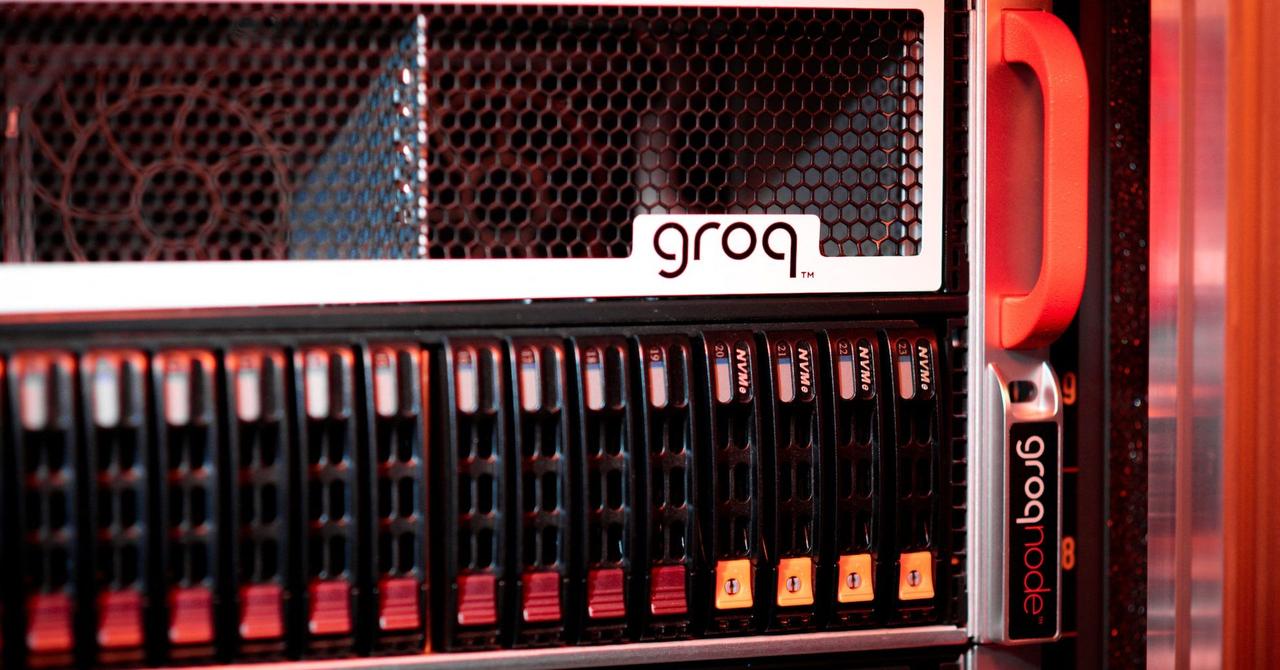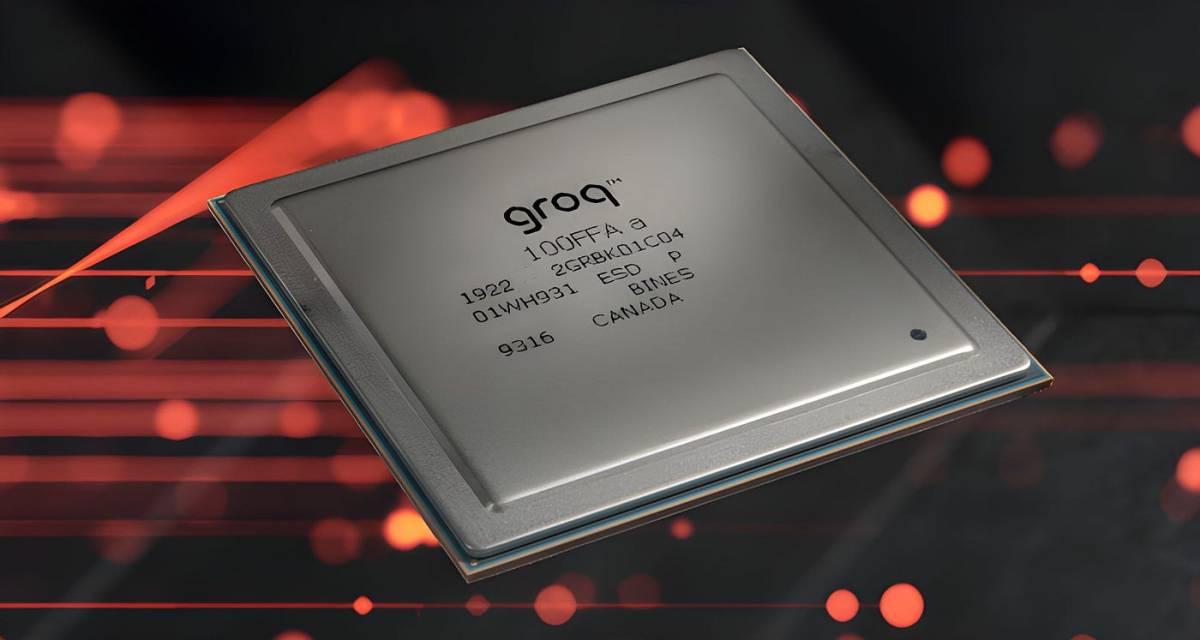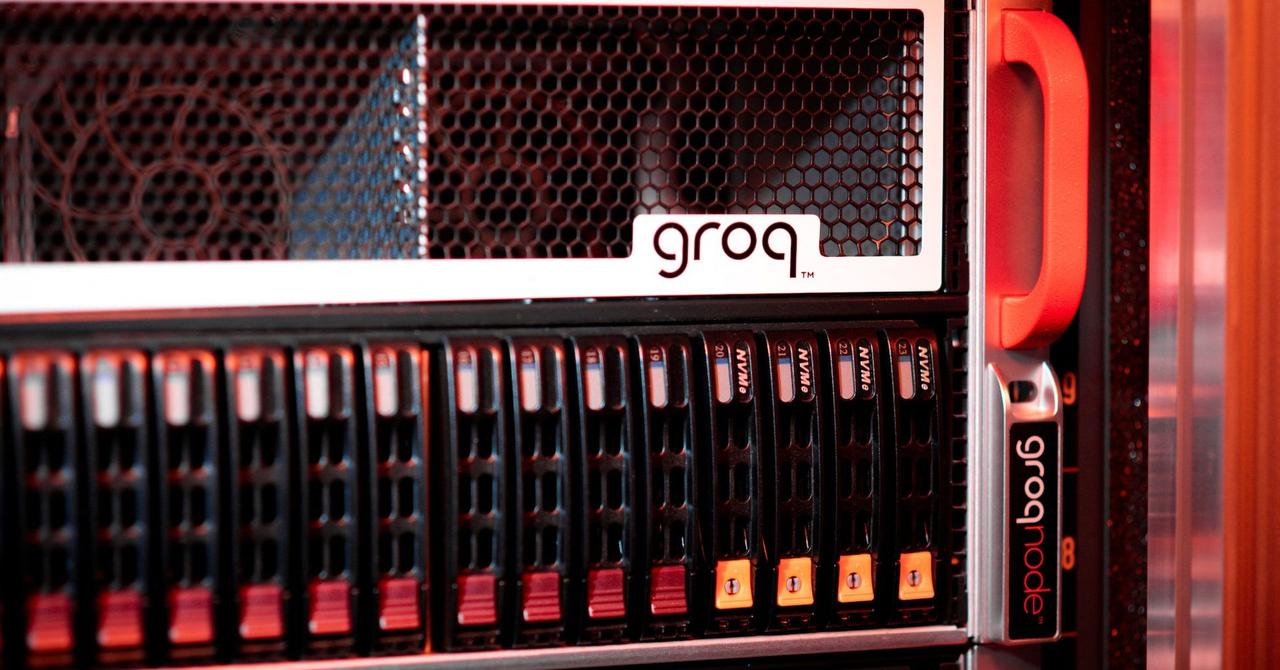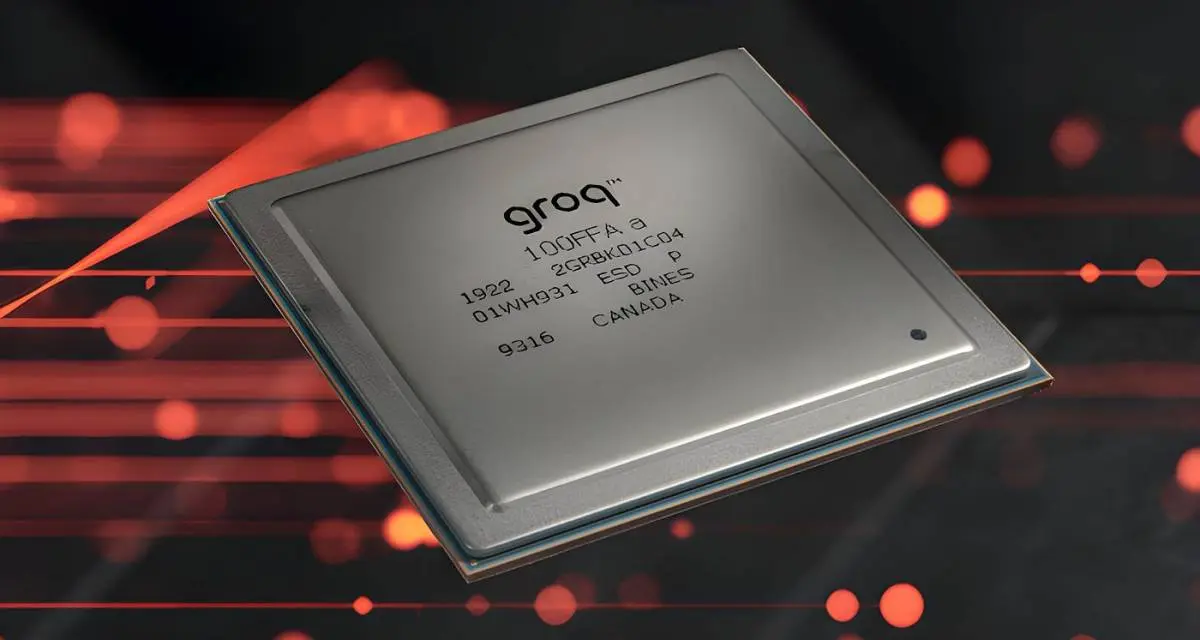AI Chip Startup Groq Secures $750 Million, Valuation Soars to $6.9 Billion
6 Sources
6 Sources
[1]
AI Chip Startup Groq Raises $750 Million at $6.9 Billion Valuation
Artificial intelligence chip startup Groq Inc. raised $750 million at a post-funding valuation of $6.9 billion, highlighting investor interest in companies seeking to alleviate a shortage of chips and computing power for AI workloads. The round was led by Disruptive, with "significant investment" from Blackrock Inc., Neuberger Berman Group LLC and Deutsche Telekom Capital Partners, as well as existing investors including Samsung Electronics Co., Cisco Systems Inc., D1 and Altimeter. Participants also included a "large US-based West Coast mutual fund," Groq said in a statement.
[2]
Chip startup Groq raises $750 million at $6.9 billion valuation
Sept 17 (Reuters) - Artificial intelligence chip startup Groq said on Wednesday it has raised $750 million in new financing at a post-money valuation of $6.9 billion. Groq, a Silicon Valley chip startup founded by a former Alphabet (GOOGL.O), opens new tab engineer, is among a long list of new chip players looking to capitalize on hundreds of millions of dollars in investments on AI hardware. The funding round was led by Disruptive with significant investment from Blackrock (BLK.N), opens new tab, Neuberger Berman, Deutsche Telekom Capital Partners and a large U.S.-based West Coast mutual fund manager, Groq said. The round also included Samsung (005930.KS), opens new tab, Cisco (CSCO.O), opens new tab, D1, Altimeter, 1789 Capital and Infinitum. "Inference is defining this era of AI, and we're building the American infrastructure that delivers it with high speed and low cost," Jonathan Ross, Groq Founder and CEO, said. In August last year, Groq raised $640 million in a Series D funding round led by Cisco Investments, Samsung Catalyst Fund and BlackRock Private Equity Partners, among others, which brought its valuation to $2.8 billion. Reporting by Arsheeya Bajwa in Bengaluru; Editing by Sahal Muhammed Our Standards: The Thomson Reuters Trust Principles., opens new tab
[3]
AI inference chip startup Groq nabs $750M at $6.9B valuation - SiliconANGLE
Groq Inc., a developer of artificial intelligence inference chips, today announced that it has raised $750 million in new funding. Databricks Inc. backer Disruptive led the round. It was joined by Cisco Systems Inc., Samsung Electronics Co., Deutsche Telekom Capital Partners and several investment firms. Groq is now valued at $6.9 million, up from $2.8 billion last year. Groq offers a processor called the Language Processing Unit, or LPU. The company claims that the chip can run some inference workloads with up to ten times higher energy efficiency than graphics cards. Groq says the LPU's efficiency is the fruit of several optimizations not included in rival chips. Coordinating the different processor components that are involved in running an AI model can consume a significant amount of computing power. According to Groq, its LPU reduces that overhead, which leaves more processing capacity for inference. The company says that its silicon can run models with 1 trillion parameters. Groq's LPU reduces the overhead associated with circuit coordination tasks using a custom compiler. The compiler calculates which circuit should perform what task before an inference workload launches, which removes the need to run the necessary calculations at runtime. Groq's compiler also optimizes AI models in other ways. Many chips use a technique called quantization to compress neural networks, which reduces their memory footprint at the expense of some output quality. Groq says that its compiler uses an improved version of the technique called RealScale. The technology only compresses the parts of a neural network that don't experience a significant decrease in output quality when they're quantized. Another selling point of the LPU is that it has a so-called deterministic architecture. As a result, it's possible to predict how much time each given computing operation will take with a granularity of individual clock cycles. According to Groq, the LPU's predictability facilitates performance optimizations that would otherwise be difficult to implement. The company sells its chips as part of an appliance called the GroqRack. The system includes nine servers that each hold multiple LPUs. Grok says that the GroqRack requires less external networking hardware than competing appliances, which lowers costs, and can be installed in data centers without major facility upgrades. The company also provides access to its chips via a cloud platform. GroqCloud, as the platform is called, hosts LPU-powered AI models that developers can integrate into their software via an application programming interface. Groq will use its new funding to expand the data center network that powers GroqCloud.
[4]
AI chip startup Groq raises $750 million at a $6.9 billion valuation
Founded by Google TPU's architect, Groq offers cloud and on-premise LPU clusters supporting open-source AI models from Meta, Google, and OpenAI. AI chip startup Groq confirmed on Wednesday that it has raised $750 million in a new funding round, bringing its post-money valuation to $6.9 billion. The new capital more than doubles the company's August 2024 valuation of $2.8 billion and brings its total funding to over $3 billion, according to PitchBook data. Founded in 2016 by Jonathan Ross, who previously led the development of Google's Tensor Processing Unit (TPU), Groq is building a direct challenge to Nvidia's dominance in the AI chip market. The company develops Language Processing Units (LPUs), which are specifically designed as inference engines to run AI models with high speed and efficiency. This focus on inference -- the process of deploying a trained model to make predictions -- differentiates Groq's hardware from the GPUs that are often used for both training and inference. Groq offers its technology to developers and enterprises through both cloud services and on-premises hardware clusters. Its platforms support open-source versions of popular AI models from companies like Meta, Google, and OpenAI, claiming to deliver comparable performance at a lower cost than Nvidia-based systems. The company's user base has grown significantly, now powering AI applications for over 2 million developers, up from 356,000 a year ago. The latest funding round was led by the investment firm Disruptive. Other participants included BlackRock, Neuberger Berman, and Deutsche Telekom Capital Partners, as well as existing investors like Samsung and Cisco.
[5]
Groq more than doubles valuation to $6.9 billion as investors bet on AI chips - The Economic Times
Chip startup Groq said on Wednesday it has raised $750 million, more than doubling its valuation to $6.9 billion in just over a year as Wall Street bets big on the hardware that powers artificial intelligence technology. Groq, founded by a former Alphabet engineer, is among a long list of new chip players looking to capitalise on hundreds of millions of dollars in investments on AI infrastructure. Its last funding round was in August last year, when it raised $640 million that brought its valuation to $2.8 billion. The round announced on Wednesday was led by Disruptive, with significant investments from Blackrock, Neuberger Berman, Deutsche Telekom Capital Partners and a large US-based West Coast mutual fund manager, Groq said. Disruptive, a Dallas-based growth investment firm that has backed companies such as Palantir and Spotify, has invested nearly $350 million in Groq, the startup said. The round also included Samsung, Cisco, D1, Altimeter, 1789 Capital and Infinitum. Groq is known for producing AI inference chips that optimize pre-trained models. The industry is increasingly shifting focus to hardware designed for inference, from the training-centric chips that characterized the early period of AI development. Leading AI chipmaker Nvidia, as well as smaller rival AMD, are both gearing up to offer more inference focused chips. "Inference is defining this era of AI, and we're building the American infrastructure that delivers it with high speed and low cost," Jonathan Ross, Groq founder and CEO, said. Groq also secured a $1.5 billion commitment from Saudi Arabia in February to expand the delivery of its advanced AI chips to the country. The startup has told investors that the contracts in Saudi Arabia will help bring in about $500 million in revenue this year, according to earlier media reports.
[6]
Nvidia Just Got Another Tailwind -- Why Groq's $6.9 Billion Valuation Proves AI Chips Are Still Hot | The Motley Fool
Nvidia's unquestioned scale and ecosystem make it a clear winner. The stock market is buzzing over chip start-up Groq's latest fundraising round. The privately held company announced that it raised $750 million, which more than doubled its valuation to $6.9 billion. Groq's chips have some specific differences from those made by the biggest chipmaker, Nvidia (NVDA 3.90%). Its chips are made solely for inference, as opposed to Nvidia chips that are designed for training and inference. Groq's language processing units (LPUs) are stripped down compared to Nvidia's graphics processing units (GPUs), and can run AI models to translate text, answer questions, or run bots fast and with lower energy use. That's appealing, considering Nvidia's GPUs cost tens of thousands of dollars apiece. But while Groq is essentially a potential competitor to Nvidia, the smaller company's new valuation is a tailwind for the mammoth company, which sports a valuation of more than $4 trillion. Why is Groq's good news also good for Nvidia? Let's take a look. Groq was founded in 2016 by a group of former Google engineers, including Jonathan Ross, who designed the tensor processing unit AI accelerator and became Groq's CEO. While the company started slowly -- and by Ross's admission, nearly folded -- it found new strength after OpenAI unveiled its ChatGPT platform in late 2022. The company currently offers a cloud product, GroqCloud, that allows users to work with its LPUs in a cloud environment, and GroqRack Cluster, which is an on-site product for customers who are running their own data centers. Groq says more than 1 million developers are currently using the GroqCloud platform. The company has completed multiple fundraising rounds, including the latest led by Dallas-based investment firm Disruptive, which has invested nearly $350 million in the company. Disruptive also invested in the launches of Palantir Technologies, Spotify Technology, Hims & Hers Health, and Airbnb. "As AI expands, the infrastructure behind it will be as essential as the models themselves," Disruptive CEO Alex Davis said. "Groq is building that foundation." Nvidia currently is the top chip supplier for data centers that are powering the most sophisticated and challenging AI-powered platforms. Nvidia has an estimated 92% GPU market share for data centers. GPUs are currently the gold standard for data center work because of their sheer power. They are capable of parallel processing, which means that they can handle millions of calculations at the same time, and they can be bundled to work together. The company's CUDA software allows GPUs to be used for general compute engines and is ideal for modern data center workloads. That's meant massive profits for Nvidia as interest in AI and AI platforms skyrocketed in the last three years. Nvidia's revenue for the first quarter of fiscal 2026 (ended July 27, 2025) was $46.7 billion, up 56% from a year ago. Its data center revenue made up the vast majority of that, bringing in $41.1 billion. While Groq is certainly a competitor to Nvidia, the two companies aren't on the same playing field yet. Nvidia has a vast array of clients and promotes its GB300 chip on the Blackwell Ultra GPU architecture, which it says sets records for speed of AI inference. Groq is a $6.9 billion company, merely by showing the potential of cheaper semiconductor chips for AI inference. But it's nowhere close to being on Nvidia's level yet -- or even the level of Advanced Micro Devices, Intel, or Apple. But it does prove how much money and interest remain in chasing AI infrastructure. And with Nvidia's unquestioned scale and ecosystem, it's still the company best positioned to profit in the quarters to come.
Share
Share
Copy Link
Groq, an AI inference chip startup, has raised $750 million in a funding round led by Disruptive. The investment brings the company's valuation to $6.9 billion, more than doubling its previous valuation and highlighting the growing interest in AI chip technology.
Groq's Landmark Funding Round
Artificial intelligence chip startup Groq Inc. has successfully raised $750 million in a new funding round, catapulting its valuation to $6.9 billion
1
2
. This significant investment, led by Disruptive, more than doubles the company's previous valuation of $2.8 billion from August 20244
. The funding round attracted notable investors, including BlackRock, Neuberger Berman, Deutsche Telekom Capital Partners, and a large US-based West Coast mutual fund manager, alongside existing backers such as Samsung and Cisco1
2
.
Source: SiliconANGLE
Groq's Innovative AI Chip Technology
Founded in 2016 by Jonathan Ross, a former Google Tensor Processing Unit (TPU) architect, Groq specializes in developing Language Processing Units (LPUs)
4
. These chips are designed specifically for AI inference tasks, aiming to deliver high-speed performance with lower energy consumption compared to traditional graphics cards3
. Groq claims its LPUs can run some inference workloads with up to ten times higher energy efficiency than GPUs, thanks to several optimizations3
.
Source: Bloomberg
Key Features of Groq's Technology
Groq's LPUs incorporate innovative features to enhance AI processing:
- Custom compiler: Reduces overhead by pre-calculating circuit tasks before launching inference workloads
3
. - RealScale quantization: An improved compression technique that selectively quantizes neural networks to maintain output quality
3
. - Deterministic architecture: Allows precise prediction of computing operation times, facilitating performance optimizations
3
.
Related Stories
Market Position and Growth
Groq is positioning itself as a direct challenger to Nvidia's dominance in the AI chip market
4
. The company offers its technology through both cloud services (GroqCloud) and on-premises hardware clusters (GroqRack)3
4
. Groq's platforms support open-source versions of popular AI models from companies like Meta, Google, and OpenAI4
.
Source: Reuters
The company has experienced significant growth, with its user base expanding to over 2 million developers, up from 356,000 a year ago
4
. Additionally, Groq secured a $1.5 billion commitment from Saudi Arabia in February to expand the delivery of its advanced AI chips to the country5
.Industry Implications
The substantial investment in Groq reflects the growing demand for efficient AI computing solutions and the shift towards inference-focused hardware in the AI industry
5
. As Jonathan Ross, Groq's founder and CEO, stated, "Inference is defining this era of AI, and we're building the American infrastructure that delivers it with high speed and low cost"2
.References
Summarized by
Navi
Related Stories
Recent Highlights
1
ByteDance's Seedance 2.0 AI video generator triggers copyright infringement battle with Hollywood
Policy and Regulation

2
Demis Hassabis predicts AGI in 5-8 years, sees new golden era transforming medicine and science
Technology

3
Nvidia and Meta forge massive chip deal as computing power demands reshape AI infrastructure
Technology








